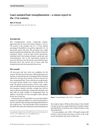 17 citations,
November 2017 in “Dermatologic Clinics”
17 citations,
November 2017 in “Dermatologic Clinics” New techniques improve hair restoration success.
 11 citations,
June 2005 in “Journal of Cosmetic Dermatology”
11 citations,
June 2005 in “Journal of Cosmetic Dermatology” Lasers in hair transplantation show promise but are not yet standard, with current methods causing some side effects and needles still being preferred for creating recipient sites.
 275 citations,
March 1999 in “Journal of The American Academy of Dermatology”
275 citations,
March 1999 in “Journal of The American Academy of Dermatology” Chemotherapy can cause various skin reactions, with hair loss being the most common, and proper diagnosis and treatment of these reactions are important.
 19 citations,
September 2004 in “Reviews in gynaecological practice”
19 citations,
September 2004 in “Reviews in gynaecological practice” Effective hirsutism management requires identifying the cause, combining new and traditional treatments, and setting realistic expectations for patients.
 March 2024 in “Dermatology and therapy (Internet)”
March 2024 in “Dermatology and therapy (Internet)” Genetic factors could lead to personalized treatments for hair loss.
 1 citations,
June 2013 in “Science-business Exchange”
1 citations,
June 2013 in “Science-business Exchange” Increasing the levels of a protein called FGF9 can promote hair growth, but humans may not respond the same way due to a lack of certain cells.
 October 2023 in “Benha Journal of Applied Sciences”
October 2023 in “Benha Journal of Applied Sciences” Methotrexate and vitamin D3 are potentially more effective and safer than triamcinolone for treating localized alopecia areata.

Platelet-rich plasma injections effectively increase hair density in men suffering from common hair loss.
 4 citations,
December 2019 in “Skin appendage disorders”
4 citations,
December 2019 in “Skin appendage disorders” Using Platelet-Rich Plasma injections for male-pattern baldness didn't significantly improve hair growth.
 September 2022 in “Women's healthcare”
September 2022 in “Women's healthcare” PCOS is managed by lifestyle changes and personalized medication to improve symptoms and fertility.
 May 2023 in “Plastic and reconstructive surgery. Global open”
May 2023 in “Plastic and reconstructive surgery. Global open” Activated PRP injections are effective in treating hair loss and improving hair density.
 14 citations,
February 2017 in “Anais brasileiros de dermatologia/Anais Brasileiros de Dermatologia”
14 citations,
February 2017 in “Anais brasileiros de dermatologia/Anais Brasileiros de Dermatologia” Trichotillomania is often misdiagnosed as alopecia areata and can be treated effectively with N-acetylcysteine and psychotropic drugs.
 7 citations,
January 2019 in “Annals of dermatology/Annals of Dermatology”
7 citations,
January 2019 in “Annals of dermatology/Annals of Dermatology” Synthetic ceramides may help hair growth by boosting cell growth in hair follicles.
 January 2023 in “Operative Techniques in Otolaryngology-Head and Neck Surgery”
January 2023 in “Operative Techniques in Otolaryngology-Head and Neck Surgery” Hair transplants help transgender patients look more like their gender identity, with different procedures for trans women and men.
 7 citations,
September 2013 in “Current Dermatology Reports”
7 citations,
September 2013 in “Current Dermatology Reports” Some skin medications are safe for pregnant women, but others pose risks or should not be used.
 3 citations,
July 1997 in “Current problems in dermatology”
3 citations,
July 1997 in “Current problems in dermatology” Hair restoration surgery has evolved over time, with a focus on natural-looking results and managing patient expectations, while also considering potential complications and the lifelong progression of male pattern baldness.
 January 2012 in “Yearbook of Dermatology and Dermatologic Surgery”
January 2012 in “Yearbook of Dermatology and Dermatologic Surgery” Acne treatment, including isotretinoin, improves quality of life and does not worsen depression.
 1 citations,
September 2023 in “Journal of drugs in dermatology”
1 citations,
September 2023 in “Journal of drugs in dermatology” Alopecia areata causes unpredictable hair loss and emotional distress, with no cure and limited treatment options.
 January 2020 in “Journal of Cosmetics, Dermatological Sciences and Applications”
January 2020 in “Journal of Cosmetics, Dermatological Sciences and Applications” DEEPLY ROOTED® supplement seems to effectively improve hair growth and quality in women with no side effects.
 27 citations,
January 2005 in “American Journal of Clinical Dermatology”
27 citations,
January 2005 in “American Journal of Clinical Dermatology” Azelaic acid and anthralin are similarly effective for treating patchy hair loss.
 June 2024 in “Journal of Dermatology & Cosmetology”
June 2024 in “Journal of Dermatology & Cosmetology” The FUL hair restoration technique is better for aesthetics and causes less scarring.
 3 citations,
March 2021 in “Clinical, Cosmetic and Investigational Dermatology”
3 citations,
March 2021 in “Clinical, Cosmetic and Investigational Dermatology” Early treatment of Lupus Erythematosus Alopecia can prevent permanent hair loss, and various medications are effective.
 100 citations,
May 2011 in “Journal of Pediatric and Adolescent Gynecology”
100 citations,
May 2011 in “Journal of Pediatric and Adolescent Gynecology” The document concludes that proper diagnosis and a multidisciplinary approach are crucial for managing Congenital Adrenal Hyperplasia effectively.
 17 citations,
February 2011 in “Expert Opinion on Drug Safety”
17 citations,
February 2011 in “Expert Opinion on Drug Safety” Manage side effects of hepatitis C treatment with dose changes and medications, which may improve patient adherence and treatment success.
 11 citations,
December 2019 in “Dermatologic Therapy”
11 citations,
December 2019 in “Dermatologic Therapy” Ketoconazole may help regrow hair and increase follicle size, but more research needed.
 39 citations,
September 2011 in “Tissue Engineering Part B-reviews”
39 citations,
September 2011 in “Tissue Engineering Part B-reviews” Hair follicle regeneration in skin grafts may be possible using stem cells and tissue engineering.
 19 citations,
January 2010 in “Bioorganic & Medicinal Chemistry Letters”
19 citations,
January 2010 in “Bioorganic & Medicinal Chemistry Letters” Thyroid receptor agonists may treat male pattern baldness without harmful side effects.
 September 2024 in “Journal of Cosmetic Dermatology”
September 2024 in “Journal of Cosmetic Dermatology” Robotic hair transplants are easier and quicker to learn than traditional methods.
 October 2022 in “IntechOpen eBooks”
October 2022 in “IntechOpen eBooks” Hair loss due to scarring can be treated by reducing inflammation, removing scar tissue, and transplanting hair. The Follicular Unit Extraction technique is effective but requires skill and time. Future focus should be on scar-less healing methods.
 49 citations,
January 2010 in “International Journal of Pediatric Endocrinology”
49 citations,
January 2010 in “International Journal of Pediatric Endocrinology” The document concludes that Nonclassic Congenital Adrenal Hyperplasia requires personalized treatment plans to manage symptoms and fertility, with glucocorticoids being a common therapy.






























